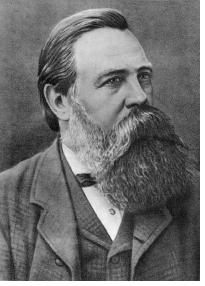Friedrich Engels
Industrialist, philospher and revolutionary, b. 28 November 1820 (Barmen, Germany), d. 5 August 1895 (London, England).
 Friedrich Engels was the son of a capitalist; his father owned a textile factory in Barmen and had a partnership in the Ermen & Engels cotton mill in Manchester, England. The young Friedrich showed an interest in philosophy and poetry , but being the son of a factory owner his only choice was to train for a life in manufacturing, business and commerce. He left high school one year before graduation to become an apprentice in an export company in Bremen, Germany.
Friedrich Engels was the son of a capitalist; his father owned a textile factory in Barmen and had a partnership in the Ermen & Engels cotton mill in Manchester, England. The young Friedrich showed an interest in philosophy and poetry , but being the son of a factory owner his only choice was to train for a life in manufacturing, business and commerce. He left high school one year before graduation to become an apprentice in an export company in Bremen, Germany.
During his three years in Bremen Engels began reading liberal and revolutionary works of literature and philosophy and began to publish articles, using a pseudonym to avoid conflict with his family. After completion of his training in 1841 he joined the military as a one-year volunteer and served in the artillery in Berlin. He took the opportunity to sit in on university lectures and join a group of progressive philosophers. This brought him into contact with communist ideas, and he became a communist himself.
On return from his service in 1842 Engels was sent to England to take a position in the administration of the Ermen & Engels firm. He was a diligent and efficient employee, but during his private time Engels studied, read parliamentary papers and wrote articles on communism for newspapers and journals. In a contribution to the Deutsch-Französische Jahrbücher (German-French Yearbooks) he developed an early version of scientific socialism by demonstrating that the capitalist system would create a world of "millionaires and paupers" and that "reconciliation of humanity with nature and itself" was only possible through elimination of private property.
When Engels returned to Barmen in 1844 he passed through Paris and established a life-long friendship with Marx, then the editor of the "German-French Yearbooks". For the next 40 years Engels and Marx worked and published together, and Engels' contribution to scientific development of communism is mostly overshadowed by the name of his friend. The work Die Lage der arbeitenden Klasse in England (The Condition of the Working Class in England) of 1845 remained for a long time the only publication with Engels' name as the only author. Based on reports of parliamentary enquiries and on Engels' own observations in Manchester, it is a thorough description of the misery of ordinary people during the rise of capitalism.
Details about the period from 1845 to Marx' death in 1883 can be found in the notes on Marx, but it should be understood that this is done only in the interest of brevity and not to belittle Engels' contribution to their joint achievments. Engels and Marx were an excellent combination: Marx had the sharper analytical mind, and Engels had the journalistic expertise to promote their ideas to the public.
After Marx' death Engels took charge of the publication of volumes 2 and 3 of Das Kapital (Capital), which Marx had left as an unfinished manuscript with a set of notes. He published two more works of his own,
- Der Ursprung der Familie, des Privateigentums und des Staats (The Origin of the Family, Private Property and the State) in 1884, and
- Ludwig Feuerbach und der Ausgang der klassischen deutschen Philosophie (Ludwig Feuerbach and the Outcome of Classical German Philosophy) in 1888.
Friedrich Engels was fortunate to have had a family that was tolerant and often supportive of his work outside office hours. He was able to support Marx, who from 1859 was without resources, with modest amounts of money and from 1864, when he had become a partner in Ermen &Engels, with substantial amounts. When moving in the circles of the ruling class, Engels gave the impression of the English gentleman - on fox hunts he could outride most of his English counterparts. Amongst workers and in public meetings he was an eloquent and convincing speaker for the cause of the working class. As a philosopher he shared with Karl Marx the laying of the foundations of scientific socialism.
Reference
Hammen, O. J. (1995) Friedrich Engels, Encyclopaedia Britannica 15th ed.
Photo: public domain (Wikipedia)
home
 Friedrich Engels was the son of a capitalist; his father owned a textile factory in Barmen and had a partnership in the Ermen & Engels cotton mill in Manchester, England. The young Friedrich showed an interest in philosophy and poetry , but being the son of a factory owner his only choice was to train for a life in manufacturing, business and commerce. He left high school one year before graduation to become an apprentice in an export company in Bremen, Germany.
Friedrich Engels was the son of a capitalist; his father owned a textile factory in Barmen and had a partnership in the Ermen & Engels cotton mill in Manchester, England. The young Friedrich showed an interest in philosophy and poetry , but being the son of a factory owner his only choice was to train for a life in manufacturing, business and commerce. He left high school one year before graduation to become an apprentice in an export company in Bremen, Germany.